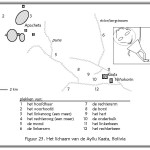Thashlin Govender Et Al – Living in Low-Cost Housing Settlements In Cape Town, South Africa—The Epidemiological Characteristics Associated With Increased Health Vulnerability
No comments yetby Thashlin Govender, Jo M. Barnes & Clarissa H. Pieper
The aim of this study was to assess the epidemiological characteristics of a representative sample of subsidized low-cost housing communities in the City of Cape Town in relation to their living conditions and their health status. Four subsidized low-cost housing communities were selected within the City of Cape Town in this cross-sectional survey. Structured interviews were administered in 336 dwellings on 173 plots.
Data was obtained from 1,080 persons with a response rate of 100%. Almost all of the state-subsidized houses had one or more shacks in the backyard, increasing the occupation density and putting the municipal sanitation infrastructure under pressure. In 40% of main houses, one or more cases of diarrhea were reported during the two weeks preceding the survey, in contrast to 23% of shacks (p<0.0007). Of the total group, 1.7% willingly disclosed that they were HIV positive, while 3.5% reported being tuberculosis (TB) positive. One of them reported having multiple drug-resistant TB. None of the HIV positive or TB positive persons was on any treatment. A reported 6.3% of the families admitted regularly eating only one meal per day, whereas 18.5% reported having only two meals per day. The shack dwellers had significantly higher education and employment status (p <
< 0.01), since they had to pay rent. Improvements in health intended by the rehousing process did not materialize for the recipients of low-cost housing in this study. The health vulnerability of individuals in these communities had considerable implications for the curative health services. Sanitation failures, infectious disease pressure, and environmental pollution in these communities represent a serious public health risk. The densification caused by backyard shacks, in addition, has municipal service implications and needs to be better managed. Urgent intervention is needed to allow the state-funded housing schemes to deliver the improved health that was envisaged at its inception.
0.01), since they had to pay rent. Improvements in health intended by the rehousing process did not materialize for the recipients of low-cost housing in this study. The health vulnerability of individuals in these communities had considerable implications for the curative health services. Sanitation failures, infectious disease pressure, and environmental pollution in these communities represent a serious public health risk. The densification caused by backyard shacks, in addition, has municipal service implications and needs to be better managed. Urgent intervention is needed to allow the state-funded housing schemes to deliver the improved health that was envisaged at its inception.
Read more: http://www.ncbi.nlm.nih.gov/pmc/articles/
You May Also Like
Comments
Leave a Reply






